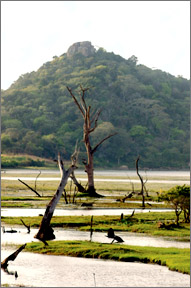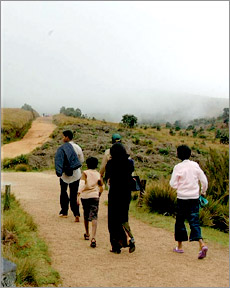Environment - the survival of mankind
Birth of an independent forum :
The inaugural session of the Public Forum :
by Indeewara Thilakarathne
 The inaugural session of the Public Forum (PF), a joint initiative by
SPARC (Social Policy Analysis and Research Centre) and the German
Cultural Centre or Goethe Institute of Colombo was recently held at the
German Cultural Centre. The inaugural session of the Public Forum (PF), a joint initiative by
SPARC (Social Policy Analysis and Research Centre) and the German
Cultural Centre or Goethe Institute of Colombo was recently held at the
German Cultural Centre.
The PF is an attempt by a civic conscious group of citizens to create
an independent social space for concerned citizens to air their views on
pressing issues, in an objective manner and to come out with concrete
recommendations.
The session commenced with the presentation by Prof. S. W. Kotagama
on environment, providing an overview of the environmental issue in Sri
Lanka. Tracing back to the very foundation of civilization, Prof.
Kotagama outlined the broader perspective of the issue.
He, particularly, emphasized the fact that any solution to the
environmental issue, should require to take into consideration the three
major elements; natural environment, structured environment (built
environment) and cultural or social environment.
It is obvious that any solution which does not take into
consideration these three elements is bound to fail. Through the process
of development, man has virtually pulled apart these three elements
breaking the natural equilibrium and creating a host of problems which
are seemingly intractable.
  The process of development and its manifold achievements have been
brought about with a growing cost of degradation of many eco-systems
producing pollutants and pollution. The process of development and its manifold achievements have been
brought about with a growing cost of degradation of many eco-systems
producing pollutants and pollution.
Prof. Kotagama pointed out that there was a marked shift of paradigms
from the position of poverty being the cause of environmental
degradation to the environmental degradation being the cause of poverty.
The former notion was overwhelmingly endorsed by international forums
over the last decade.
He stated that for the first time in history, Sri Lanka is
experiencing 'environment refugees' as thousands were rendered
internally displaced by massive landslides and floods. Although the
scientists warned of this calamity in the 1980's when large chunks of
soil were eroded from the up-county and washed off in the rivers, the
authorities did not heed the warnings.
Although people advocated the three Rs, re-use, re-cycle and refuse,
people are still reluctant to refuse things that they do not really
want. Dr. (Mrs) Ajantha Perera in her presentation on the problem of
garbage disposal extensively dealt with the handling of garbage by local
authorities.
Among other things, she pointed out that the local authority's modus
operandi of piling up garbage on dumping sites, has, in fact, endangered
the lives of the neighbours.
When the rain water gushes through the mountains of garbage, water
takes with it, all soluble substances in the garbage, polluting the
waterways and sweeping through the make-shift houses of the community
nearby. This process has not only polluted the otherwise, drinkable
water but also caused the spread of viral and bacterial diseases
claiming considerable lives annually.
She emphasized that the environment impact assessment should always
be a must before the setting up of an industry and that the industrial
development and environment protection should go hand in hand in order
to achieve greater economic growth with little damage to the
environment.
One of the salient aspects of her presentation was the practical
approach she advocated in separating garbage at home into paper, glass,
plastics and tins. This will, in turn, facilitate re-use and re-cycling
process. She also insisted that every one should use a compost bin so
that some of the waste can be turned into usable manure.
Dr. Sirimal Abeyratne of the University of Colombo extensively dealt
with the economic aspects of the environment issue. However the main
gist of his presentation seemed to be on the areas of developing
infrastructure.
He questioned the economical viability of maintaining cluster
isolated villages, suggesting that they should be integrated into the
neighbouring cities which will drastically reduce the cost of developing
infrastructure.
He argued that rather than developing the cluster of scattered
villages, it was far more economical to develop a mega city providing
modern amenities. The land, thus, saved could be used for industrial and
agricultural purposes deploying mechanized production methods.
Sena Peiris in his presentation touched upon several aspects of cost
incurred in the production of consumer goods. He stressed that enormous
energy had been burnt in producing seemingly insignificant-articles and
goods. According to Sena Peiris, every consumer goods are the results of
a complex production process which had burnt a lot of fuel.
He attributed environment pollution to man's greediness and unbridled
consumerism which has plundered the limited resources. The man has
forgotten the requirements and become a slave to materials and energy.
He stated that society should change the attitudes and people should
adopt a simple life-style prioritizing requirements and reducing wants.
[email protected] |
